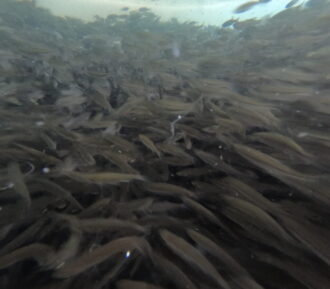FAYETTEVILLE, Arkansas – University of Arkansas researchers are partnering with rice farmers across the state on a project to reduce winter methane emissions in rice fields while providing an additional income stream to acreage.
With a $30,000 On-Farm Research Grant, funded by Southern Sustainable Agriculture Research and Education (SSARE), bioengineer Benjamin Runkle is adding fish to rice fields during the time of year when fields lay fallow. Runkle hopes that introducing fish to the fields in the winter will help decrease methane emissions while creating year-round productivity and a new revenue source for farmers.
“Rice is a large source of methane emissions during the summer growing season, but less is known about these emissions in the winter period. In Arkansas, 27.5 percent of the fields are flooded in winter for ecological reasons, such as attracting waterfowl, but that increases methane emissions by up to 45 percent, compared to non-flooded fields, and previous studies indicate that these emissions can equate to about 10% of the annual emissions,” said graduate student Sam Carroll, who is participating in the project. “Due to the importance of reducing methane emissions in general, we need methods to reduce methane during that fallow season and co-cultivation is one strategy.”
The idea of co-cultivation, said Runkle, is not anything new. Similar strategies are conducted in Louisiana, incorporating crawfish production in rice fields, and in China where duck and crab are co-cultivated with rice.
“The difference is that we are looking at that added income stream during the winter and trying to reduce those methane emissions in the off season,” said Runkle. “The idea of co-cultivation gets people to think of the landscape as a whole system. We are pleasantly happy to find that farmers are willing to change, but they want things scientifically tested to make sure the production system works.”
In the three-year project, Runkle and his colleagues are implementing a “fish-in-the-fields” system first studied by environmental and biodiversity advocacy group Resource Renewal Institute in California. Initial research from their trials indicates that fish introduced in rice fields has the potential to reduce methane emissions by up to two-thirds. The SSARE-funded project takes RRI’s work and applies it to a much larger rice production system using golden shiners as the fish.
“The concept is that the fish eat the zooplankton that eat the methanotrophs (bacteria that metabolize methane as their food and energy source), thereby reducing methane emissions,” said Runkle.
After one season of preliminary data collection, the field with fish present had about 55 percent lower methane emissions than the field with no fish. After two seasons of data collection, results on the effectiveness of fish are mixed, with lower methane emissions in the field with fish present in the first season, and lower emissions in the field with no fish in the second season. However, researchers found that overall, methane emissions in the winter were much lower than emissions in the growing season, and lower than the few other studies reporting on this period’s emissions. Difficulties such as fish mortality, lack of replicates, and inconsistencies between the fields made it challenging to relate decreased methane readings to the presence or absence of the fish.
More years of data and further statistical analysis are needed to draw more definitive conclusions. Indeed, the researchers are doing just that with a new Natural Resources Conservation Service (NRCS) Conservation Innovation Grant from the Arkansas office of the NRCS, to test the impact of fish in more targeted ways.
Arkansas is the largest producer of rice in the United States, growing about half of it for export to such areas as the Middle East and the Caribbean. Other rice-producing states include Texas, Louisiana, California, Mississippi, and Missouri.
Other cooperators on the project include Jamie Anderson of I.F. Anderson Farms, Inc.; Mark Isbell of Zero Grade Farms; Chance Cutrano, RRI Director of Programs; Deborah Moskowitz, RRI President; Beatriz Moreno Garcia, University of Arkansas research associate; Michele Reba, USDA hydrologist with Arkansas State University; Dayan Perera, bait and sport Extension specialist at University of Arkansas at Pine Bluff; and Shawn Devlin, aquatic ecologist with University of Montana.
